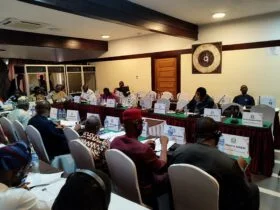The ECOWAS Parliament has called for practical measures to address barriers hindering private sector growth and job creation across West Africa.
This resolution came at the end of a meeting of the Parliament’s Joint Committee on Administration, Finance, Budget, Public Accounts, Macroeconomic Policy, Economic Research, Industry, and the Private Sector, held Friday in Monrovia, Liberia.
Lawmakers at the meeting emphasized the importance of supporting small and medium enterprises (SMEs), streamlining regulations, and improving access to finance to drive economic development and reduce unemployment in the subregion.
They listed the challenges to include unstable and inconsistent government policies, inadequate electricity supply, unconducive environment, and pervasive insecurity, among others.
Participants emphasised the need to strengthen financing mechanisms for small and medium-sized enterprises (SMEs), improve business environments, promote high-employment-potential sectors like industrial agriculture, renewable energy, and digital technologies.
Sen. Osita Izunaso, for instance, identified the perennial lack or inadequate power supply faced by the private sector in member countries as a major hindrance to the growth of the sector and regional economic growth.
“As a private sector player, how do you plan when you are not sure of what government policies are?
“Power is still an issue. We’re still grappling with the issue of diesel and petrol to power our machines.
“Now, if you are a big industrialist and you are doing something, how do you pay your staff, take care of your overheard, and remain profitable?” He asked.
The Nigerian senator also decried the subregion’s human capital deficit, noting that the scarcity of quality manpower to drive the economies of member states was a formidable obstacle to economic growth.
He said that the ECOWAS Parliament was taking measures to bridge the manpower deficit by refocusing on vocational training and human capital development.
Izunaso said that there was also the need for a stable legal framework, stressing that investors required certainty in the law.
He also identified insecurity as one of the biggest challenges confronting private sector growth and job creation in West Africa.
“Once you’re not sure of your investment, once you’re not sure of your life, then it becomes a problem,” he said.
Sen. Sharafadeen Abiodun, another MP from Nigeria, in his submission, expressed dismay over the deep-seated fear by the youth in the subregion for their future.
He attributed their apprehension to the economic instability, currency fluctuations, and critically, and unstable policies, which have plagued ECOWAS member states over the years.
The lawmaker also expressed his disapproval of the incentives which ECOWAS countries often extend to foreign investors for prolonged periods at the expense of local companies.
He urged governments to strike a balance, encouraging foreign investment while simultaneously ensuring stable foreign policy.
In his submission, MP Zakariya Nyampa, called for affordable and monitored policies, especially considering the widespread corruption that plagues implementation.
The parliamentarian decried the decline in interest by the youth in vocational skills like welding and carpentry, which he said were fundamental to their daily needs and offered them income generation opportunities.
“The youth should explore these trades, alongside embracing technology and ICT.
“Regarding insecurity, you can’t even go to the farm, even if it’s within a developed area, somebody will just come and harvest your farm before it’s ripe 100 per cent.”
“It is also imperative for governments to protect citizens’ investments and labor,” he added.
The News Agency of Nigeria (NAN) reports that the five-day event, which ended on Friday, focused on the effectiveness of ECOWAS’s investment policies and their impact on job creation in the region.
This aligns with ECOWAS’s ongoing efforts to reduce unemployment rates, particularly among youth, and foster inclusive growth in West Africa.



